Born in Argentina, Pope Francis knows the devastating reality of fracking and supports the international fight against the exploration of oil and shale gas. His Encyclical Letter Laudato Si’ (Praised Be) is inspiring bishops, priests and the faithful in the battle against hydraulic fracturing, a highly polluting non-conventional method for shale gas exploration also known as Fracking. The encyclical urges us to take care of our ‘common home’ and reminds us of the moral obligation we all have to look after the planet and ensure the survival of all living beings. In this document, the Pope criticises consumerism and irresponsible development, and makes an appeal for change and global unity in order to fight environmental degradation and climate change.
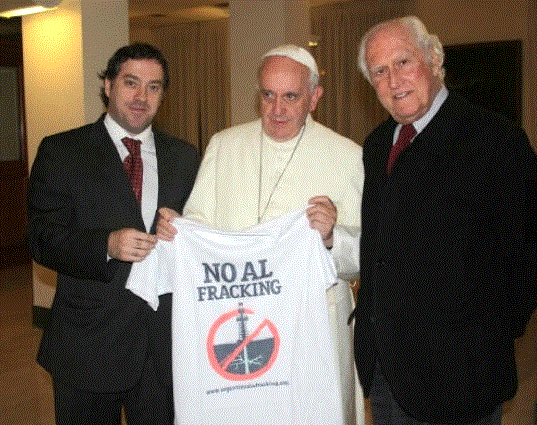
The battle against hydraulic fracturing in that country is championed by Senator Fernando ‘Pino’ Solanas and environmentalist Juan Pablo Olsson, members of the Proyecto Sur party and of COESUS Argentina.
In Brazil, several dioceses are supporting the Não Fracking Brasil (No Fracking Brazil) campaign. “Providing spaces for training courses for priests, city administrators and community members, we’re bringing Pope Francis’ message of preserving life, water sources and the divine work”, explains Reginaldo Urbano Argentino, president of Cáritas Paraná and 350.org campaigner. Along with several entities, Cáritas is a member of COESUS – Coalizão Não Fracking Brasil pelo Clima, Água e Vida (No Fracking Brazil Coalition for Climate, Water and Life).
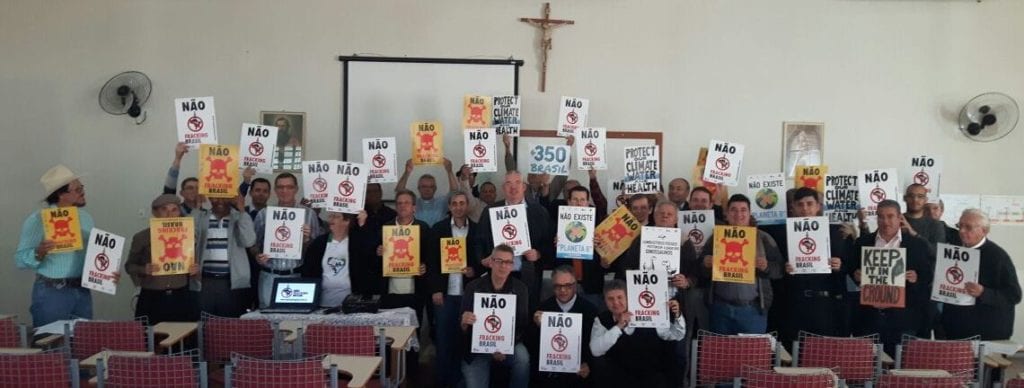
This week, Reginaldo was in Paranavaí, a city in Northwest Paraná, to guide priests and members of the Municipal Council for the Environment. The meeting was attended by the Diocese’s Bishop, Geremias Steinmet, who supports the No Fracking Brazil campaign and pledged commitment to spread information in churches and parishes about the risks and dangers of hydraulic fracturing.
“The goal is to multiply these actions and promote a broad debate with communities for them to pressure municipal legislators to pass bills prohibiting fracking,” Reginaldo adds.
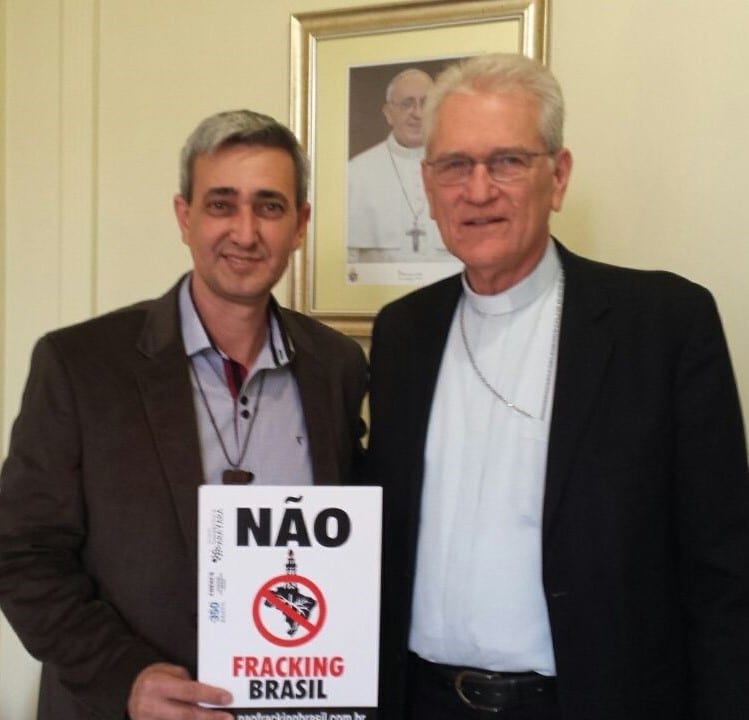
In Brasilia, regional work aims to reach the national level. In a meeting at the National Conference of Bishops of Brazil (CNBB), Bishop Leonardo Steiner, the organisation’s General Secretary, expressed interest in providing information on fracking to the National Council of Bishops, and was interested in cooperating with the campaign to prevent fracking from taking place in Brazil. “Support from the National CNBB is very important. It plays a role in guiding regional dioceses and the power it has to spread information is fundamental for us. Making information about fracking reach as many citizens as possible and turning the fight against shale gas exploration into a priority for all sectors of society at different levels are our main goals,” says Reginaldo.
Irreversible environmental impacts
FRACKING is a highly polluting technology which causes irreversible and permanent damage to water supplies, soil and air, as well as serious diseases, such as cancer, in both people and animals. To extract shale gas from deep underground, millions of litres of water, which is mixed with sand and a cocktail of 720 chemicals, including toxic, carcinogenic and even radioactive ones, are injected into the ground. This then makes the rock explode (fracture) and release methane at a high environmental cost.
There is no drinking water, agriculture or livestock where fracking is used, and it severely affects biodiversity. Called ‘death gas’, fracking is now also proven to be associated with the occurrence of earthquakes, causing panic and damages to families living near wells.
Death Gas
Hundreds of Brazilian Catholic Church leaders have been intensely involved in mobilisation actions to inform the public about the federal government’s intention to implement this technology in the country without prior debate with the organised civil society.
Dozens of cities are debating and approving bills to ban fracking in order to prevent the impact of the death gas, as the methane released from the subsoil is being called.
In the state of Paraná, the City Councils of Londrina, Cambé, Arapongas and São Manoel do Paraná are in line with Pope Francis’ encyclical request, i.e. to keep fossil fuels in the ground, consume responsibly and care for the planet in order to ensure a sustainable, safe future for all living beings.
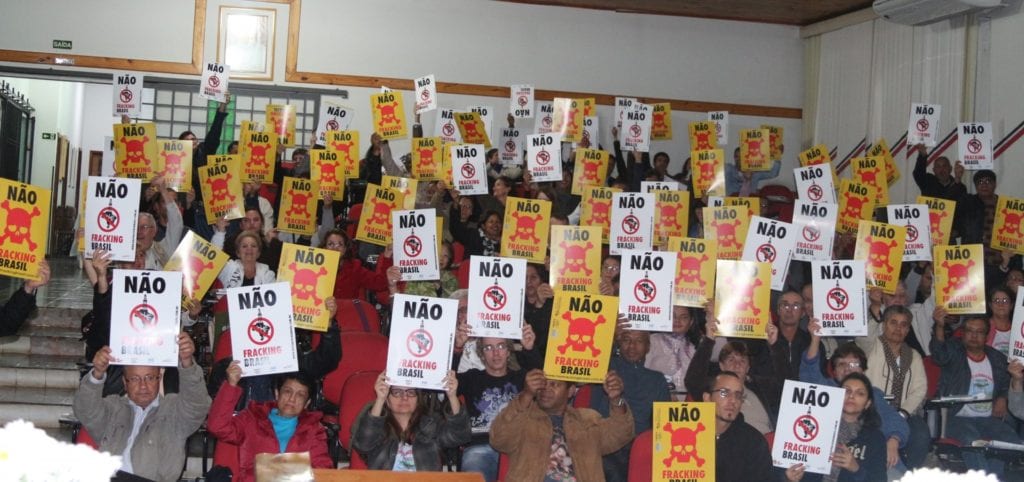
Bela Vista do Paraíso

A meeting in Bela Vista do Paraíso attended by representatives from different sectors within the Archidiocese.
Cambé
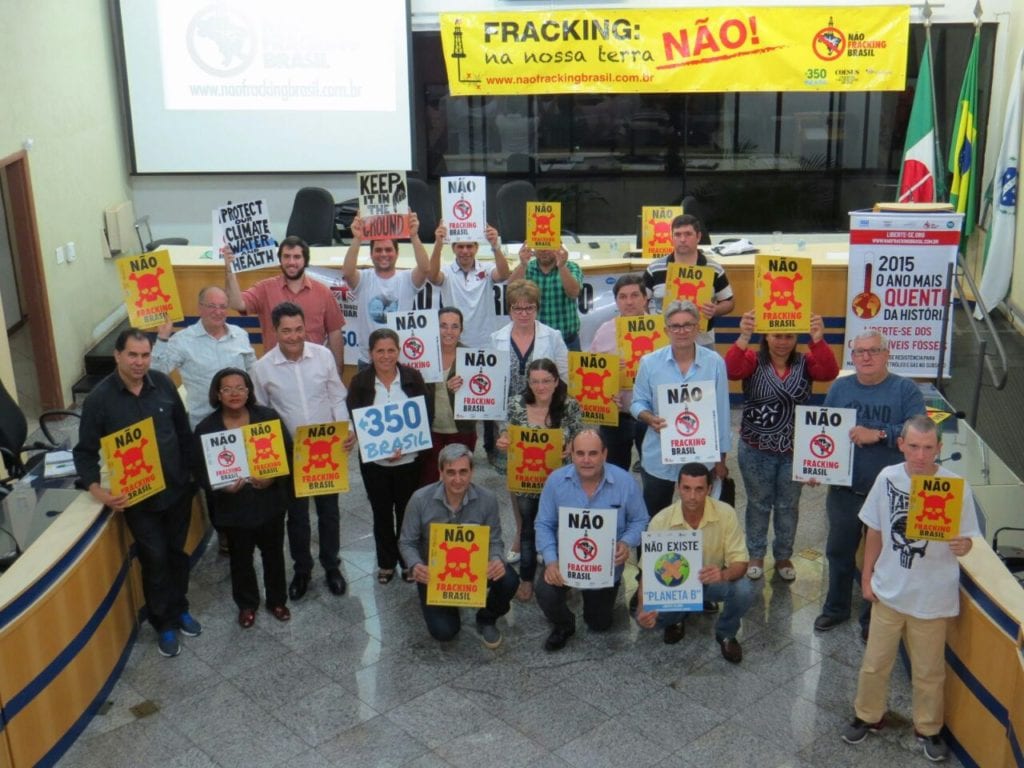
At a meeting in the Cambé City Council, the bill authored by Councilman Cecílio Araujo prohibiting fracking operations in the city was debated. The meeting was attended by religious leaders, associations, unions and residents.
Photos: COESUS/350Brazil